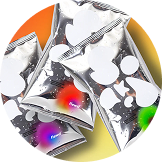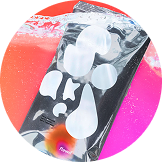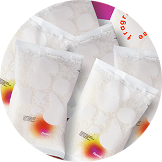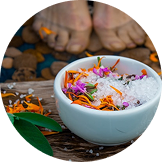Whether you are feeling the effects of a grueling workout or stress has taken a physical toll on your body, you’re trying to find relief fast so you can get back to living your life without limits.
So, is a hot bath good for sore muscles? It certainly can be - especially when you combine it with our one-of-a-kind muscle bath soak! The warm water itself can help increase blood circulation, relax tense muscle fibers, and aid in recovery.
But incorporating our magnesium bath soak takes things to a whole new level. It’s called the Ache Eraser for a reason! Magnesium chloride with Vitamins C & D and Omega 3s can help melt away aches and pains in minutes, leaving you feeling completely rejuvenated.
Learn more about taking a hot bath for muscle soreness below, including why this is so beneficial in the first place, how long to soak in hot bath for sore muscles, and more. Let’s start with a quick look at some of the common causes of sore muscles.
Common Causes of Muscle Soreness
You might be able to trace your muscle soreness to something specific you did, be it intense exercise or even something more subtle like yard work, washing your car, playing with the kids, or something else.
Athletes and active individuals are all too familiar with DOMS - or delayed onset muscle soreness. This is that feeling you get in the 24 to 48 hours following exercise where your muscles feel like jello and the pain can hold you back from even simple tasks.
It makes sense when you think about it, though. Exercise - be it from running, lifting weights, or even playing a sport - creates microtears in muscle fibers. Your body goes to work healing the damage and this is how you get stronger. In the meantime, though, it’s uncomfortable.
However, sometimes soreness has nothing to do with physical activity. It could be as simple as poor posture from sitting at a desk or working a manual labor job all day.
Or, maybe it’s the result of stress and tension. That’s right - stress can manifest itself in the form of physical discomfort. This is especially common in the neck, shoulders, and back.
Whatever the case, you want relief fast. So, is a hot bath good for sore muscles?
Is a Hot Bath Good for Sore Muscles?
Yes - a hot bath for muscle soreness can be a great way to feel better quickly. But let’s take a closer look, how does a hot bath help sore muscles? There are a few things to unpack here.
Promotes Blood Flow and Oxygen Delivery
The heat of a warm bath causes your blood vessels to dilate, improving circulation throughout your body. This brings more oxygen and nutrients to your muscles, which speeds up the healing process.
We mentioned already that sore muscles are often the result of microscopic tears or inflammation. Better circulation helps flush out waste products like lactic acid that build up after exercise, reducing the overall discomfort and jumpstarting the recovery process.
If it’s not the result of DOMS, it could be an underlying injury. What you’re feeling is likely inflammation. A hot bath can help support your body’s natural inflammatory response by promoting circulation and reducing tension in the affected area.
Relaxes Muscle Tension
While a hot bath for sore muscles is actively working to enhance your body’s recovery process, it also just plain feels good.
The warmth helps loosen muscle fibers that have contracted due to exertion or stress. This reduces muscle stiffness and makes it easier for you to move, which can be especially helpful if you're experiencing tightness in areas like your shoulders, neck, or legs.
The warm water also helps calm the nervous system, which sends signals to your muscles to relax even further. It’s a dual approach to calming your body and mind.
Speaking of stress, this is another reason we love hot baths for muscle soreness. The calming environment of warm water helps lower stress hormones like cortisol, allowing both your body and mind to unwind.
This has an added benefit for those with sore muscles, as it can help you get a better night’s sleep. This is where your body actively recovers, which is why quality sleep is so important.
Enhances Flexibility and Mobility
Immersing in a hot bath is going to warm your muscles, obviously. This sets the foundation for you to improve your flexibility and range of motion, which is important when managing muscle soreness.
After a bath, your muscles are more pliable and responsive to stretching, making it easier to move without discomfort. Stretching after a hot bath can further reduce muscle soreness and stiffness that may set in later.
Ice Bath or Hot Bath for Muscle Soreness: Which is Better?
It’s clear a hot bath for sore muscles can offer profound relief in a timely manner. But maybe you’re trying to weigh the pros and cons of an ice bath or hot bath for muscle soreness. Which is better?
Each has its place, but hot and cold therapy work in very different ways. You know the benefits of a hot bath for soreness, so let’s look at the other side of the coin.
Benefits of Cold Therapy on Muscle Soreness
Cold therapy works wonders for reducing inflammation and numbing pain. The muscles can become swollen after an intense workout or injury as a result of those microscopic tears we keep mentioning.
An ice bath helps constrict blood vessels, which reduces blood flow to the area and minimizes swelling. This, in turn, helps prevent the onset of DOMS and reduces pain immediately after exertion.
Meanwhile, cold therapy can lower the metabolic activity of muscles, which slows down the damage process and gives your body more time to recover. The numbing effect also just desensitizes your body to pain temporarily.
Should You Choose One or the Other or Do Both?
While both hot baths and cold baths have their place in managing muscle soreness, they work differently and should be used at different times.
Cold therapy has its place immediately after a workout or injury when inflammation is at its peak. On the other hand, baths are better suited for relaxing muscles and improving circulation during the recovery phase, usually a day or two after exercise.
The heat helps loosen tight muscles, promotes blood flow, and reduces stiffness. Hot baths also provide mental relaxation, which can help ease the overall stress your body feels after a hard workout.
That being said, there’s an elephant in the room we haven’t even mentioned yet - ice baths suck! It’s not an enjoyable experience at all. That’s why ultimately, we recommend sticking with hot baths for sore muscles. We’ll set you up for success with some tips on getting started below.
How Long to Soak in Hot Bath for Sore Muscles
While it sounds so simple, there are a few nuances to consider when taking a hot bath for sore muscles to make the most of the experience. The most important are water temperature and duration.
A Word on Water Temperature
There’s a fine line between a hot bath that heals sore muscles and overdoing it, causing discomfort and dehydration. The ideal water temperature is between 92-98°F (33-37°C).
This is the sweet spot where you’ll experience relaxation and muscle recovery without overheating your body. Water that’s too hot can lead to dehydration or dizziness, ultimately causing more harm than good.
Optimal Soak Duration and Frequency
As far as how long to soak in magnesium bath, we recommend at least 15-30 minutes. This gives your body enough time to absorb the heat, relax, and improve circulation. It’s also important for getting all the good ingredients you’ll add like magnesium soak vs epsom salt - more on that in a moment.
From a frequency perspective, 2-3 times a week is usually plenty to manage muscle soreness. While you technically can soak more frequently, you do run the risk of drying out your skin. Plus, quality magnesium soaks like the ones we’ll recommend below can add up in cost.
More Tips on Taking a Hot Bath for Muscle Soreness
If you’re ready to experience the relief that comes with hot baths for sore muscles, there are just a few more tips we want to share below - most importantly, harnessing the power of healing bath recipes!
Adding Bath Soaks for Enhanced Recovery
First things first, what is a bath soak and why should you add it to your recovery regimen? These are not to be confused with other solutions, as we discuss in our comparison of a bath soak vs bath bomb.
These aren’t those fun, fizzy products you’ve seen in the past. Rather, they contain powerful ingredients to supercharge your wellness goals - such as magnesium, vitamins, and other minerals. In some cases, they may contain nootropics and essential oils.
They can be tailored to a specific goal. In this case, muscle soreness is the priority - but there are also anxiety bath soak and stress relief bath soak solutions worth considering.
While you certainly could try a DIY bath soak for sore muscles, there is a better method waiting for you here at Flewd Stresscare. You can experience the magnesium soak benefits in just a few clicks with our Ache Erasing soak!
It contains magnesium chloride, the most bioavailable form of magnesium. It’s also formulated with vitamins C and D, which are essential for calming muscle inflammation and repairing tense, overworked muscles. Meanwhile, omega 3s release built-up toxins, further relieving muscle tension and promoting relaxation.
The refreshing citrus scent derived from mandarin and clementine adds an aromatherapy element, so the soak is even more rejuvenating and stress-relieving. Use this soak for up to five days of stress and muscle relief after just one bath. Try it today and put soreness in the past!
Incorporating Light Stretching or Massage
We mentioned earlier that part of why a hot bath is good for sore muscles is that it leaves them more pliable and flexible. So once you get out of the bath, go through a light stretching routine or do some self-massage.
This will further release tightness and improve your range of motion, aiding in muscle recovery. Follow the stretching up with some foam rolling, lacrosse ball work, or if you’re able to, get a partner to work on the deep tissue that’s most sore - be it your legs, neck, shoulders, etc.
Other Methods for Managing Muscle Soreness
We know you came here specifically to learn about using a hot bath for muscle soreness, and that’s certainly an excellent step toward relief. But there are so many other ways to manage sore muscles beyond a nice warm bath. Here are some parting tips to get back to full form fast:
- Hydration: Drink plenty of water before and after your workout or bath to flush out toxins and aid muscle repair. This is especially important for those using bath soaks, as magnesium can be dehydrating.
- Proper Nutrition: Getting enough protein and omega-3s to support muscle recovery and reduce inflammation is essential. Further to that point, you should be in a caloric surplus - giving your body the fuel necessary to recover.
- Rest: It sounds obvious, but give your muscles time to heal with rest days between intense workouts or strenuous activities. That also means making sure you’re getting enough quality sleep, as this is where your body repairs itself.
- Active Recovery: Just because you need rest doesn’t mean you should sit around doing nothing. Low-impact activities like walking or yoga to keep blood flowing and reduce soreness, speeding up the recovery process.
These tips, paired with our bath soak for sore muscles, will have you feeling better in no time. So, order yours today and see for yourself what a difference a hot bath for sore muscles can make in your recovery routine!
Wrapping Up Our Guide to Taking a Hot Bath for Sore Muscles
So, is a hot bath good for sore muscles? The answer is a resounding yes, which is why the better question is, how does a hot bath help sore muscles? There are a few moving pieces at play - from the warm water itself to the inclusion of magnesium and other powerful ingredients.
We have more tips on how to use bath soak in our blog, including how to make magnesium bath soak, does magnesium soak into skin, magnesium soak vs oral, is magnesium soak good for you, and more.
But at this point, you know that relief is just a few clicks away. Don’t let muscle soreness slow you down. Take the next step towards recovery by combining our products at Flewd Stresscare with a hot bath for muscle soreness!

























































